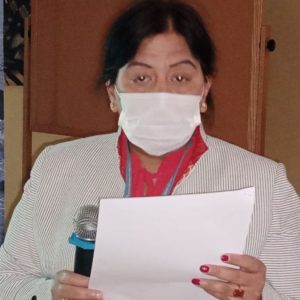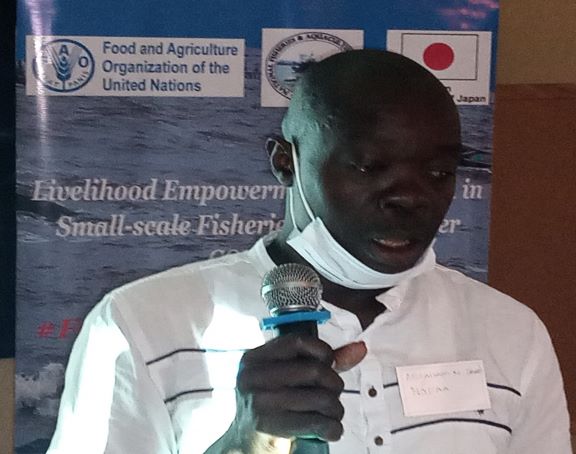PHOTO: Abraham Saah, Supervisor of Fisheries Monitoring Center
By Augustine Octavius, augustineoctavius@gmail.com
The National Fisheries and Aquaculture Authority (NaFAA) has observed that illegal, unreported, and unregulated (IUU) fishing remains one of the greatest threats to marine ecosystems.
A NaFAA official says this due to its powerful ability to undermine national and regional efforts to manage fisheries sustainably as well as endeavors to conserve marine biodiversity.
The Supervisor of Fisheries Monitoring Center, Abraham Saah, who spoke on behalf of the Director General of the National Fisheries and Aquaculture Authority, Emma Metieh-Glasco, said that the battle against illicit fishing activities in Liberia should be focused on collaborative solutions and enforcement through public-private partnership initiatives.
Mr. Saah made the assertion when he delivered the keynote speech marking the beginning of a four-day training on illegal, unreported and unregulated fishing workshop organized by the Food and Agriculture Organization of the United Nations in collaboration with the National Fisheries and Aquaculture Authority in Paynesville outside Monrovia
According to him, emphasis must be place on relationship between combating IUU fishing practices and creating food security in Liberia.
He added that implementing these enforcement models in developing nations is essential to addressing IUU fishing issues.
“Additionally,” he went on , “the vastness of the sea itself and the ability of IUU fishing vessels to navigate distant waters outside of nations ’s Exclusive Economic Zones (EEZs) poses logistical enforcement problems
Mr. Saah pointed out that by equipping underdeveloped countries with the required resources and training to monitor IUU fishing practices within their waters can present a united front to this threat.
“There is a need for shared intelligence between agencies, governments, and organizations,” Mr. Saah; adding : “the value of collaboration—in developing response policy, is about how we partner to bring about change.”
In remarks, the Acting Country Representative of the Food and Agriculture organization of the United Nations in Liberia , Paracah Ajmal Mehnaz, said the FAO is working collaboratively with the National Fisheries and Aquaculture Authority and all key stake holders from all interagency.

Ajmal Mehnaz, FAO acting Country Rep.
They include the Liberia Artisanal Fisheries Association, the Collaborative Management Association , the fishing cooperatives and the media houses to deter and eliminate illegal, unreported and unregulated fishing activities within the marine territorial water of Liberia.
According to her, the protection Inshore Exclusive Zones and Exclusive Economic Zones of territorial water in Liberia is significant in this endeavor.
Madam Ajmaz maintained that the Monitoring, Control and Surveillance activities in every FAO post states measure agreement is meant strictly for fisheries compliance , illegal, unreported and unregulated fisheries poses serious threat marine aquatic lives and place the fisheries sector at a huge lost revenue generation in Liberia.
“IUU fishing activities in some of the most lucrative business practice by industrial vessels and locals globally,” she said; adding : “ the FAO welcomed the NAFAA’s efforts aimed at curbing illegal, unreported and regulated fishing in Liberia.”
The four-day workshop, which is funded by Japan, brought together about 50 participants and it designed un the project titled” Livelihood Empowerment of Women in Small-Scale Fisheries during the after Covid-19.

Participants at the forum
The training is aimed at strengthening all NAFAA and all interagency capacities to deter and eliminate illegal, unreported and unregulated fishing in Liberia.
The key results are for NAFAA and all key stake holders , monitoring control and surveillance capacities are strengthened and sustainable , IUU is minimized and marines resources are managed harvested sustainably
The workshop brought together representatives from the National Fisheries and Aquaculture Authority ,key stake holders in the fishery sector, the Liberia Artisanal Fisheries Association, the Collaborative Management Association , the fishing cooperatives, government agencies and the media houses

